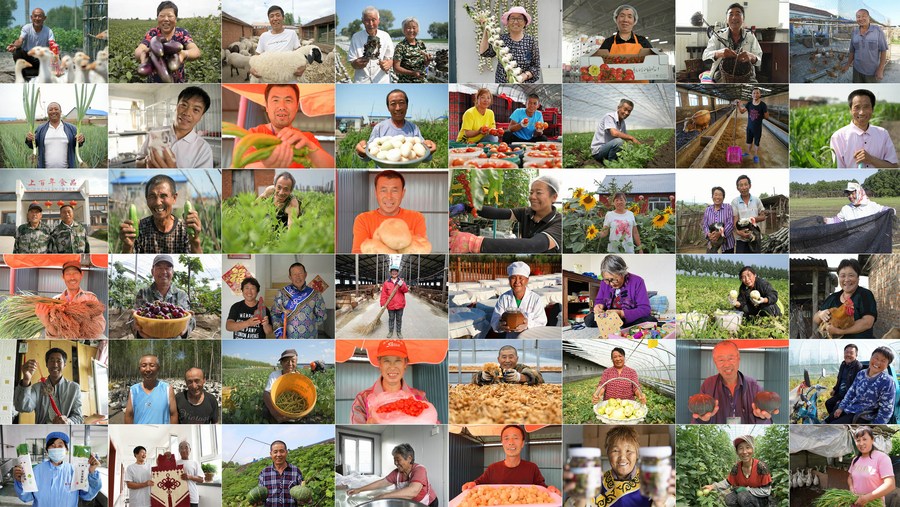White paper documents China's journey towards moderate prosperity

Combo photo taken between July and October 2020 shows villagers, who used to be registered as impoverished households in over 20 cities and counties of northeast China's Heilongjiang Province, smiling as they have benefited from the businesses under poverty alleviation program. (Xinhua)
BEIJING, Sept. 28 (Xinhua) -- China's State Council Information Office Tuesday issued a white paper to document the country's journey to moderate prosperity in all respects, or Xiaokang, and share its experience in modernization.
The white paper, titled "China's Epic Journey from Poverty to Prosperity," said the realization of moderate prosperity in all respects, as declared in July, marks a critical step towards national rejuvenation for the country.
"Achieving moderate prosperity fulfills a long-cherished dream of the Chinese nation," it said.
The document hailed the unremitting hard work by the Communist Party of China (CPC) and the Chinese people and looked into what China has accomplished in realizing prosperity through all-round development for all.
"To realize moderate prosperity has required great perseverance and represents a notable achievement on the part of the CPC and the people," it said.
Moderate prosperity in China, according to the document, is evident in the following respects: sustainable and sound economic development, expanding people's democracy, a flourishing cultural sector, improvement in people's wellbeing and great changes to the eco-environment.
It has also ensured prosperity for every individual, integrated urban-rural development and coordinated development across regions, said the white paper.
Building a moderately prosperous society in all respects means that all sectors, all people and all regions should benefit from it, Zhao Chenxin, an official with the National Development and Reform Commission (NDRC), said, highlighting a balanced, coordinated and sustainable development.
While achieving a historic transformation from a low-income country to an upper-middle-income country, China adopted a targeted strategy and has helped all of its 99 million poor rural people rise out of poverty by the end of 2020.
Ning Jizhe, deputy head of the NDRC, said China's Gini coefficient, an index reflecting inequality where zero equals perfect equality, showed a downward trend in recent years. Last year, the country's Gini coefficient declined to 0.468 from 0.491 in 2008.
The country's ratio between the per capita disposable income of urban and rural residents has been declining steadily for 13 consecutive years since 2008, Ning said, adding that the ratio stood at 2.56:1 in 2020.
Amid economic advancement, the country has made strong headway in preventing and controlling pollution, attaining major achievements in its drive to keep the skies blue, the waters clear, and the land pollution-free, according to the white paper.
Regarding realizing moderate prosperity in all respects as a major contribution China has made to the world, the white paper also expounded on how the world will benefit from China's prosperity.
As the world's most populous and largest developing country, China has contributed to global peace and development by achieving moderate prosperity in all respects, it said.
In achieving a moderately prosperous society, China has helped dramatically reduce the world's poverty-stricken population and gain a new experience of modernization for humanity, while its all-round opening up has promoted win-win cooperation, said the white paper.
"China's experience offers a new option for those countries and peoples who are looking for both rapid growth and independence, and its success provides them with considerable opportunities for development," it said.
Ning said moderate prosperity in China means huge opportunities for the global economy, citing estimations that in the next five years, the country's imports of goods are expected to exceed 10 trillion U.S. dollars, and its outbound direct investment is likely to top 550 billion dollars.
"This will surely provide a strong impetus for the steady recovery and sustained development of the global economy," he said.
Despite the remarkable achievements, the white paper said China still faces tough challenges such as unbalanced and inadequate development, while the world today is experiencing a level of change unseen in a century, with greater instability and uncertainty.
But the country is confident that it has the capabilities and resources to make more impressive progress, it said.
China aims to achieve basic socialist modernization by 2035 and become a modern socialist country that is prosperous, strong, democratic, culturally advanced, harmonious and beautiful by the middle of the 21st century.
The country will propel its unique modernization forward and make substantial progress in well-rounded human development and common prosperity, said the white paper.
Photos
Related Stories
- China contributes to world peace, development by achieving moderate prosperity: white paper
- China helps to dramatically reduce world's poverty-stricken population: white paper
- China achieves prosperity through hard work: white paper
- China ensures prosperity for every individual: white paper
- China confident of making more impressive progress: white paper
Copyright © 2021 People's Daily Online. All Rights Reserved.










